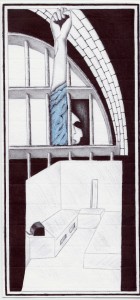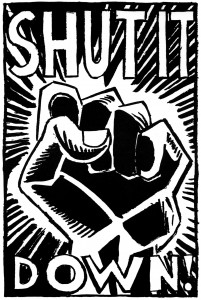Prison Abolition is a ‘Pipe Dream’ and By the Way Your Blog Sucks…
Sometimes I get the funniest e-mails even if the author does not mean it to be so…
Right before the holidays, I received an e-mail from someone who was incensed that I would suggest that we need to abolish prisons. The e-mail ended with this sentence: “By the way your blog sucks!” I did not add the exclamation point…
I am not going to quote the e-mail here because I did not get permission to do that. I do however want to address myself to one of the points that the author raised. The author wrote that prison abolition is a “pipe dream.” This is not the first time that I have been accused of being naive or worse “delusional.”

I really do understand how threatening it must be in our American punishment culture to hear the words “prison abolition.” I have previously written about my response to the perennial question that I am asked about what we will do with all of the “bad people” in a previous post about transformative justice. I have also shared some resources about abolition here and here.
Today, I would like to offer more insights about what I mean when I speak of prison abolition. The first thing to know is that not all abolitionists think alike. This should not be surprising. It’s a big world and we are all shaped by our varying experiences. So I am speaking for myself here and not for all prison abolitionists.
I don’t feel defensive about my position. I am analytical by nature and after evaluating the evidence I have concluded that prisons are harmful, corrupting, and have not ended violence but instead perpetuate it. I think that anyone who honestly assesses the role and impact of prisons on our society would come to a similar conclusion as I have. Given that the PIC is detrimental, it is incumbent on all of us to re-imagine a viable and humane alternative to address our social problems.
In her excellent book Right to Be Hostile, my friend and colleague Erica Meiners persuasively makes the case that the current system is beyond reform:
“The system does not work. It does not provide rehabilitation. It targets poor people and people of color and lends itself to interlocking relationships with other institutions. It is directly connected to the histories of race and oppression in the United States and it is difficult to talk about our contemporary prison system in isolation of slavery. It forecloses other avenues of conceptualizing and addressing the trauma of violence, and, arguably, does little to improve the lives of communities and individuals who experience harm (p.167).”
I know that some of the individuals who are currently locked up have caused great harm to people and to communities. I do not minimize this at all. This is why I am so passionate about the need for us to create alternative community-based structures to address harm and to mediate conflicts. This is supremely important and will be integral if we are to achieve the long-term goal of abolishing prisons.
When I speak of abolition, I am therefore clearly not talking about closing prisons tomorrow. None of the abolitionists that I know imagine that we will not always need to find a way to ensure accountability for violent people who repeatedly cause harm. We believe in creating the conditions necessary to ensure the eventual possibility of a ‘world without prisons’. I turn once again to Erica who brilliantly encapsulates how I too conceptualize abolition:
“For myself, working toward abolition means creating structures that reduce the demand and need for prisons. It is ensuring that communities have viable, at least living-wage jobs that are not dehumanizing. It means establishing mechanisms for alternative dispute resolution and other processes that address conflict or harm with mediation. It means ensuring that our most vulnerable populations, for example, those who are mentally ill or undereducated, do not get warehoused in our prisons and jails because of the failure of other institutions such as healthcare and education. It means practicing how to communicate and to live across differences and to rely more on each other instead of the police. Working toward a horizon of abolition requires an acknowledgment that prisons have been used, as Davis, writes, as ‘a way of disappearing people in the false hope of disappearing the underlying social problems they represent’ (Davis, 2005, 41).”

So for me, abolition does not mean the immediate closing of all prisons. It means that we have to organize and mobilize to address the root causes of oppression and violence. It means that we have to be prepared to creatively re-imagine our current structures of policing and warehousing individuals. It means that we have to test the limits of our imagination of what’s possible in terms of addressing violence and harm. It means that we have to always expose the brutality and utter failure of the current system. It means that we have to be at the forefront of a revolutionary transformation of consciousness while demanding that our resources be radically reallocated towards social justice. Indeed it means refusing to accept that prison abolition is a “pipe dream.”
